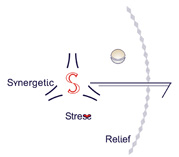Stress is acknowledged nowadays as a major health hazard that contributes significantly to reduction in the quality of life. It becomes ever so important to find more effective ways of helping the individuals come to terms with stress generating aspects of work and private life, to empower them to attain their health, well-being, and other potentials that constitute the quality of life. This, in turn, would provide opportunities for peak performance in the workplace and all the benefits that go along.
Work-related stress (WRS) was recognised as a serious problem in the previous decade. Different strategies have been developed and deployed to counteract its effects as well as to introduce preventive measures. In the meantime more and more reports world-wide indicated that WRS was a growing and costly threat, even for the leading economies.
Some governments put much effort to face and address the real causes, create and implement new strategies, provide guidance to employers, health services, and the general public. While this process is under way, the employees seem to be carrying the most of the burden related to WRS and its consequences.
A more holistic approach to human health, well-being, and the quality of life certainly makes a lot of sense in such circumstances. This is being growingly acknowledged in the UK as the key to success in stress management, since the end of 2005.
3. Mental Health Perspective
The World Health Organisation (WHO) warns that there is a growing number of people who suffer from mental and neurological disorders and psychosocial problems. WHO estimates that, by the year 2020, depression is going to become one of the main causes of death in the world – due to increasingly stressful styles of life, growth of poverty and violence in the years to follow.
The preventive and therapeutic properties of the SSR Programme are invaluable and constitute a timely and adequate response to mental health challenges ahead.
4. Health, Economy, and Sustainable Development
Analyses by the WHO Commission on Macroeconomics and Health (a report titled “Macroeconomics and Health Care: Investment into Health Protection for Economic Development”), show that ill-health drains economies and societies. Investment in health spurs economic and social growth. In the work of WHO with Member States, attention will be given to furthering research on identifying cost-effective interventions outside the health sector, which could lead to improved health outcomes.
Good health is central to the development process. Health contributes to integrating the social, economic and environmental dimensions of sustainable development and is pivotal within each one. It is the precondition for increase of productivity and far more equitable and efficient functioning of a society.
Prevention of work-related stress, by implementing an adequate stress management programme, is likely to be highly cost-effective investment for employers, in the long run.
The SSR Programme is comprehensive and has huge and versatile potentials for implementation within and outside the health sector. To name but a few: the field of work, personal development, sector of education, sector of social services, recreation, etc. The SSR Programme is capable of fulfilling all the requirements related to sustainable development – in a holistic, integrated, and cost-effective way.
5. Adequate Treatment
“The health measures, which do not yield expected results cannot be considered adequate.” – the former Director-General of the World Health Organisation, Mrs. Gro Harlem Bruntland.
As defined by WHO, health is a state of complete physical, mental, and social well-being and not merely the absence of disease or infirmity.
The International Labour Organisation report from 2000 indicated that success of stress interventions is frequently short-lived. Similar criticism is veiled at other health promotion programmes where a large number of participants often revert to previous practices.
It is becoming more and more evident that the existing policies and practises related to health and safety at work need to be reviewed, particularly in the context of work-related stress and sustainable development.
The problem of stress needs to be treated with the utmost sincerity and determination in applying adequate measures throughout the spectrum of the society and particularly in reference to the health. Vulnerable groups and individuals need special attention.
Conventional medical and psychosocial methods of treatment have not yielded the desired results in relation to stress, and generally with chronic diseases. That is why the traditional and upon them based innovative treatments have been tried in contemporary health care. In the UK these treatments are recognised and implemented within the National Health Service (NHS) through the Health Promotion Clinics concept, and referred to as complementary medicine.
The SSR Programme is undoubtedly an offspring of the Health Promotion Clinics concept of the UK’s National Health Service. It builds on the best UK health promotion policies and most effective complementary medicine practices. But, at the same time, it extends and focuses on specialised training and adequate support as the key factors for success in attempting to facilitate a positive change in a client’s condition. The empowerment of an individual, in a true sense, is the key strategic approach.
6. Person Centred Approach
“We need to put people in the centre of everything we do.” – Mrs. Bruntland (WHO)
An individual is in the centre of everything the SSR Programme is about. The clients are not left alone with the information of what would be a good change for them; instead, they are encouraged, assisted, and supported in adequate ways to take more responsibility for their health, lifestyles, and attitudes. They are motivated, as well as trained, to help themselves and overcome the residues of painful past, get to grips with ongoing challenges, and open up to new possibilities awaiting them. This is empowerment in a true sense.
Back to top
© 2007 Brian Potter and Predrag Stankovic
graphic design by P & T Visuallies © 2007 |

